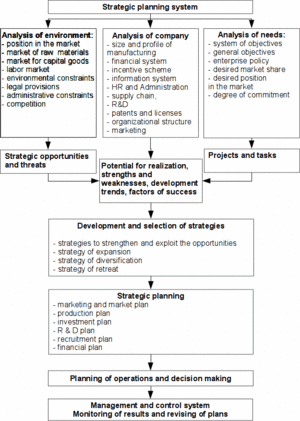Strategic planning functions: Difference between revisions
(Infobox update) |
(The LinkTitles extension automatically added links to existing pages (<a target="_blank" rel="noreferrer noopener" class="external free" href="https://github.com/bovender/LinkTitles">https://github.com/bovender/LinkTitles</a>).) |
||
| Line 26: | Line 26: | ||
* creating [[innovation]] and adapting to changes in [[environment]], | * creating [[innovation]] and adapting to changes in [[environment]], | ||
* developing ways to meet the [[needs]] and expectations of customers as well as to improve position of the company in a [[competitive environment]], | * developing ways to meet the [[needs]] and expectations of customers as well as to improve position of the company in a [[competitive environment]], | ||
* long-term planning and forecasting, | * long-term planning and [[forecasting]], | ||
* integrating and coordinating factor for other functional programs, investment projects and operating plans. | * integrating and coordinating factor for other functional programs, investment projects and operating plans. | ||
Revision as of 02:33, 21 January 2023
| Strategic planning functions |
|---|
| See also |
Strategic planning functions consist of several activities performed by management in every organization. They are directed to long term goal setting and decision making. Management roles and responsibilities for strategic planning include several activities (management functions):
- decision-making process in critical business areas,
- strategic programming,
- developing strategies on corporate level,
- developing strategies for company business units (SBU)
- developing of functional strategies,
- developing business plans,
- selecting business objectives, primarily regarding the specification of products (services), calculation of prices, marketing functions, costs, quality, production, technological parameters, etc.
- creating innovation and adapting to changes in environment,
- developing ways to meet the needs and expectations of customers as well as to improve position of the company in a competitive environment,
- long-term planning and forecasting,
- integrating and coordinating factor for other functional programs, investment projects and operating plans.
Strategic planning as a system
Managers should pay attention to the relationship and differences between planning and forecasting. The plan is a defined course of action - the action program, and the forecast is a prediction of processes beyond our control. Plan therefore relates to these processes and components, in which manager can make a choice - take a decision. Prediction defines only forecast of the future state of processes or economic phenomena, not assuming any interference in this state through the decisions and action. The plan is evaluated in terms of effectiveness and impact resulting from undertaken activities activities, the forecast is evaluated only in terms of its relevance. Forecasting and planning are closely linked in the management process, but they should not be equated with each other.
Role of strategic planning
Strategic planning is a powerful system, which form the structure of the various strategies (programs) and plans. They are developed at corporate level, for each SBU, and also at the level of businesses or departments. The degree of detail and accuracy of their preparation increases as plans are passed to lower levels of management.
Functional strategies and plans usually relate to specific issues, such as: improvement of the organizational structure of enterprises, research and development, improvement of manufacturing technology, staff development, productivity improvement, total quality management implementation. In such plans there is a connection with the projections of the diagnostic part in shaping the future of the company. If these projections are optimistic, in business practice they are referred to as a strategy or development plans.
References
- Das, T. K. (1991). Time: The hidden dimension in strategic planning. Long Range Planning, 24(3), 49-57.
- Glaister, K. W., & Falshaw, J. R. (1999). Strategic planning: still going strong?. Long Range Planning, 32(1), 107-116.
- Mintzberg, H. (1994). The fall and rise of strategic planning. Harvard business review, 72(1), 107-114.
- Steiner, G. A. (2010). Strategic planning. Simon and Schuster.
- King, W. R. (1983). Evaluating strategic planning systems. Strategic management journal, 4(3), 263-277.
Author: Krzysztof Wozniak
